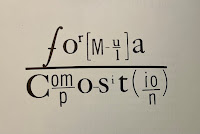Can difficulty with understanding mathematics be compared with physical blindness -- a difficulty that is biological rather than chosen? This is a question that has come to my mind as a reaction to Wislawa Szymborska's poem (offered below) "The Courtesy of the Blind." This Szymborska poem is part of a wonderful online collections of poetry, Poetry 180, a poem for each day of the 180-day public school year.
Poem 119: The Courtesy of the Blind by Wislawa Szymborska
Polish poet Wisława Szymborska (1923-2012)
was the 1996 recipient of the Nobel Prize in Literature
and the author of over 20 volumes of poetry.
The poet reads his lines to the blind.
He hadn’t guessed that it would be so hard.
His voice trembles.
His hands shake.
He senses that every sentence
is put to the test of darkness.
He must muddle through alone,
without colors or lights.







